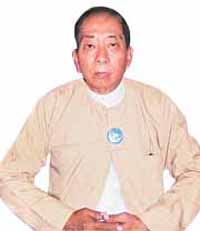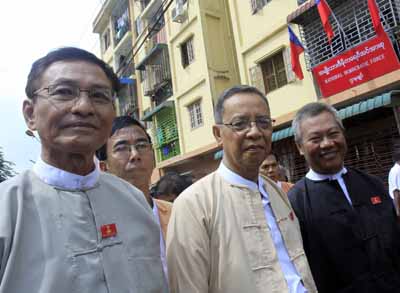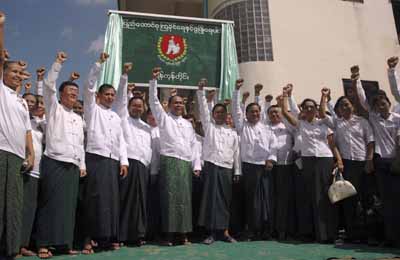
| By HTET AUNG | SEPTEMBER, 2010 - VOL.18 NO.9 |
Whether due to a fear of junta retribution or the universal inability of politicians to commit to detailed platforms, Burma’s new political parties have produced only vague economic policies.
The Burmese opposition, newly formed political parties and the international community have spent the last several months questioning whether the upcoming election can provide a change in the country’s political environment that brings the Burmese people at least a baby-step closer to democracy. But for many of those at the lower end of Burma’s economic scale, the more imminent question is: Can the election positively alter Burma’s floundering economy?
 |
| Democracy and Peace Party Chairman Aung Than |
In addition, thanks to the large-scale exploitation of the country’s natural resources, the junta’s coffer of foreign hard currencies has risen in value from a few hundred million dollars in 1988 to billions today. With the income stream expected to increase, future governments will be tasked with deciding what role the public and private sectors will play in managing the country’s wealth.
Other economic issues that involve at least some level of government involvement and decision making are prominent as well. Asked to name the single biggest difference between the past and present economy that affects the Burmese population as a whole, Aung Than, the chairman of the Democracy and Peace Party (DPP), said: “The value of money. In the past, our currency was valuable and we gained profits in trading with other countries. But the situation has now been turned upside down, and we need to change it.”
So it stands to reason that one of the main issues to be debated by the more than 40 political parties in the run-up to the election would be the steps that should be taken to improve the direction the country’s economy and put more rice and curry on people’s tables. But for whatever reasons—be they fear of the big sticks wielded by the junta’s censorship board and election commission, lack of understanding and lack of time to consult economic experts, or simply the universal affliction of politicians being unwilling to address difficult issues—Burma’s fledgling political parties have been largely silent on economic matters.
The most detailed policy statements have been put forth by the junta-backed Union Solidarity and Development Party (USDP), which is led by the incumbent prime minister and is expected to dominate the election. The USDP party platform, a copy of which was obtained by The Irrawaddy, says the party will practice a “market economy” without elaborating on what that means. But the document goes on to describe a USDP economic policy with 10 specific points, all of which reflect the junta’s current economic policies.
The USDP’s economic goals include: “To ensure the participation of all the stakeholders such as the state, the regional associations, co-operatives and private enterprise in the economy; to help the growth of small and medium enterprises; to [protect the monopoly] of an individual or a group; to help the native businessmen to be able to compete with the foreign investors; and to guarantee no demonetization of the currency.”
In addition, the USDP platform says the party will build the capacity of the Tatmadaw [the military] through its “political might, economic might and military might.” This suggests that the USDP would maintain the protectionist policies that the junta has utilized to favor the military-run economy that dominates the overall economy in order to make sure the generals and their cronies can harvest most of the profit to be had in the marketplace.
The USDP also intends to fulfill the junta’s economic objective of keeping the power to shape the national economy in the hands of the state, which Aung Than refers to as “state capitalism.” This means the USDP will continue to allow the government to stage-manage the economy in favor of the major players, who under the current privatization trend will end up owning most non-state businesses and resources, while still not allowing farmers to own their own land.
 |
| NDF leader Khin Maung Swe, left, and chairman Than Nyein outside the party’s Rangoon headquarters. (Photo: The Irrawaddy) |
“We call it ‘Association for the Promotion of the People’s Social and Economic Life,’ which is a bottom-up approach led by the villagers themselves,” Aung Than, a Supreme Court lawyer, told The Irrawaddy. “The government’s role is just as a stakeholder to give initial financial support to the associations and later withdraw its share when they have the capacity to function by themselves.”
Aung Than criticized the economic associations currently managing different sectors of the economy as top-down systems operating with the blessing of the generals in power and formed for the benefit of the businessmen, not for the poor.
With regard to the recent privatization of state-owned businesses such as fuel distribution, seaport operation and private airline operation, Aung Than said: “The market lacks real competition and a handful of rich businessmen enjoy these opportunities while the majority have little access to the capital. We need to change this situation.”
The Shan Nationalities Democratic Party (SNDP) and the Chin Progressive Party (CPP) appear to be in line with the DPP when it comes to supporting something close to a true free market economy. The SNDP platform says it will practice a free market economy that conforms with the world trade system, and priority will be given to active cooperation with regional and global economic groups.
But when asked by The Irrawaddy to expound on his party’s economic platform, in particular how it intended to cooperate with regional groups and conform the Burmese economy to the world trade system, an SNDP executive committee member said that his party’s policies were determined by the executive committee and he could not provide any further details about the policies or produce an internal expert who could explain them.
The CPP platform says the party will practice a “modern agriculture-based free market economy,” and priority will be given to free trade and allowing both locals and foreigners to invest in the banking business. But the platform also says the party will conduct the development of small, medium and heavy industries, as well as the extraction of the natural resources in a particular region to help support that regions’ development, suggesting some government role in managing the economy.
The macro-economic polices of the National Political Alliances (NPA) party are also a mixed bag. While its platform says that the state will encourage “an accumulation of wealth” by the private sector and the introduction of a functioning stock exchange as an essential characteristic of the market economy, it also says the state will protect, by law, “a fair distribution of wealth” and that ways must be found to distribute the natural resource revenues for the welfare of the people in areas such as health, education and social security—with priority given to immediate public needs such as electricity, clean water, the stability of the commodity prices, low-cost housing, better transportation and communication systems.
The National Democratic Force (NDF), which is led by former leaders of the National League for Democracy (NLD), accepts an even more prominent role for the state in regulating the market and promoting the expanded participation of the private sector. The NDF would practice “social liberalism” through a “market-oriented mixed economy,” according to a policy document published by the party.
The NDF’s policy paper also criticizes the current economic situation, saying: “The economy is declining and the income gap is very large while the size of the middle class is shrinking in the country.” Asked to elaborate on these assessments, the chairman of the NDF, Than Nyein, said: “People know the situation, and I don’t need to say anything. I want to talk only about our party’s policies.”
 |
| Members of the U nion Solidarity and Development P arty celebrate the opening of a campaign office in Rangoon on Aug. 20. (Photo: AP) |
The problem is that their differences, with one important exception, have not been elaborated, so there is no way of knowing whether an NDF or DPM-led government would have economic policies any different from those of the junta. The one exception lies in the area of land ownership.
Burma is an agro-economic society, with 70 percent of the population living in rural areas. In the era of the Burmese Socialist Programme Party (BSPP), led by Gen Ne Win, the socialist government declared that all the land, water and air are owned by the state, with farmers only having “the right to work on their farmland.”
Despite the fact that Burma’s socialist economy collapsed in 1988, the USDP has embraced the old BSPP policy, saying, “If they let the farmers own their farmlands, they will fall into the hands of the rich, leading to a new era of feudal landlords and landless farmers.”
Ironically, the National Unity Party (NUP), formerly the BSPP, has now given up on its old unsuccessful land ownership policy. And the SNDP, the NDF, the CPP, the Democratic Party (Myanmar) and the Kayin Peoples Party (KPP), among others, have all rejected the old policy of state-owned land as well.
“Only with a clear sense of ownership will farmers have an incentive to increase their productivity,” said Saw Say Wah, the secretary-general of the KPP. “Without real ownership, the farmers may find themselves in difficult straits, since the government can distribute or confiscate land at its own discretion.”
The CPP platform says it will introduce a land law focusing on the fair ownership of farmlands, and the SNDP party platform states, “The party believes that farmers have the right to own their farmland and the right to transfer the ownership of their lands.” In addition, as part of its “green environment scheme,” the SNDP will encourage individuals and groups to own and maintain private forests.
With few exceptions, therefore, the new political parties propose a break from the regime on the macro-economic issues of state influence over the economy and private land ownership. However, when it comes to the details of how these changes would be brought about, and just as importantly how the micro-economic issues of spurring local business and agricultural activity and productivity in a manner that creates sustainable jobs paying a living wage, the new political parties are either silent or extremely vague.
While politicians worldwide are known for dodging economic questions and creating broad-brush policy platforms, Burma’s new breed of politicians seem to be operating well below a bar that has already been set very low. It is understood that they have an uphill task—they face a parliament that will surely be dominated by the USDP, as well as an entrenched junta bureaucracy that will be resistant to change. At some point, however, the opposition politicians who have been pushing for a seat at the table of governance will have to step up and make detailed economic proposals that show they are prepared to govern.